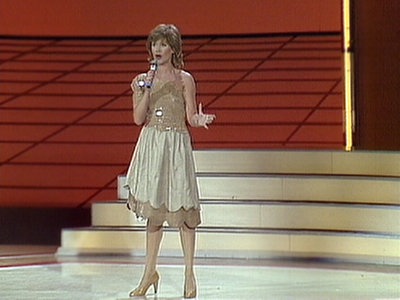Herreys
Date: May 5, 1984
Venue: Grand Theatre, Luxembourg
Presenter: Désirée Nosbusch
Orchestra: Pierre Cao orchestra
Conductor: Pierre Cao
Director: René Steichen
Scruteneer: Frank Naef
Host broadcaster: RTL
Price presenter: Corinne Hermès
Interval act: Prague Theatre of Illuminated Drawings
Duration: 2 hours, 13 minutes
Number of entries: 19
Debuting countries: -
Returning countries: Ireland
Withdrawing countries: Greece, Israel
Winning Song: Diggi-Loo Diggi-Ley - Herreys, Sweden
Voting system: Each country awarded 12, 10, 8-1 points to their 10 favourite songs
Entries
01. Sweden: Herreys - Diggi-Loo Diggi Ley (1st place, 145 points)
02. Luxembourg: Sophie Carle - 100% d'amour (10 place, 39 points)
03. France: Annick Thoumazeau - Autant d'amoureux que d'étoiles (8th place, 61 points)
04. Spain: Bravo - Lady, lady (3rd place, 106 points)
05. Norway: Dollie de Luxe - Lenge leve livet (17th place, 29 points)
06. UK: Belle & the Devotions - Love games (7th place, 63 points)
07. Cyprus: Andy Paul - Anna Mari-Elena (15th place, 31 points)
08. Belgium: Jacques Zegers - avanti la vie (5th place, 70 points)
09. Ireland: Linda Martin - Terminal 3 (2nd place, 137 points)
10. Denmark: Hot Eyes - Det'lige det (4th place, 101 points)
11. The Netherlands: Maribelle - Ik hou van jou (13th place, 34 points)
12. Yugoslavia: Vlado & Isolda - Ciao, amore (18th place, 28 points)
13. Austria: Anita - Einfach weg (19th place, 5 points)
14. Germany: Mary Roos - Aufrecht geh'n (13th place, 34 points)
15. Turkey: Beş Yıl Önce, On Yıl Sonra - Halay (12th place, 37 points)
16. Finland: Kirka - Hengaillaan (9th place, 46 points)
17. Switzerland: Rainy Day - Welche Farbe hat der Sonnenschein (16 th place, 30 points0
18. Italy: Alice & Franco Battiato - I treni di Tozeur (5th place, 70 points)
19. Portugal: Maria Guinot - Silêncio e tanta gente (11th place, 38 points)
Mary Roos
The Eurovision Song Contest 1984 was the 29th Eurovision Song Contest and was held on 5 May 1984 in Luxembourg.
Format
In an introductory video at the start of the show, Pierre Cao and the RTL orchestra performed instrumental versions of all the past Eurovision winners from Luxembourg.
The presenter was Désirée Nosbusch. Nosbusch, only 19 years old at the time, hosted the show in a lax manner, which was quite unusual for this show back then. She manifested her fluency in four languages when she switched between English, French, German and Luxembourgish in the course of her speech, often in the same sentence.
Maribelle
The Herreys were the winners of this Eurovision with the song, Diggi-Loo Diggi-Ley. Their "golden shoes" have become a pop-cult classic since their win in 1984. The win was Sweden's second, and the first for a song performed in Swedish. The previous Swedish winner, Waterloo by ABBA in 1974, had been performed in English. Diggi-Loo Diggi-Ley was written by Torgny Söderberg and Britt Lindeborg.
The song Diggi-Loo Diggi-Ley is a perfect illustration of the time period in which it was performed; a very upbeat 1980s-style dance song, performed by three impossibly clean cut young men. Fellow Swedish Eurovision participant Tommy Körberg famously dubbed them the dancing deodorants in the press, a derogatory nickname that stuck with them for the rest of their career in their home country. The nonsensical title harking back to previous entries such as Boom Bang-a-Bang, Ding-A-Dong and La La La. The song has achieved considerable fame among Eurovision Song Contest fans, with a well-known archive of Contest lyrics using the domain name diggiloo.net, named after it. Despite the reception the song receives today, in the run-up to the Contest it was not an immediate favorite to win; bookmakers Ladbrokes had Ireland's "Terminal 3" and Italy's "I treni di Tozeur" as higher favourites, so the song winning came as a surprise to many.
According to author John Kennedy O'Connor's The Eurovision Song Contest - The Official History, The Herrey's opened the contest and thus became the third winners of the competition to sing from pole position, following Teach-In in 1975 and Brotherhood of Man in 1976. No song sung first has won since.
Linda Martin
Participating countries
Israel withdrew from the contest due to a local memorial day commemorated on the same date. This year is also notable as one of the first contests where audible booing for an entry could be heard from the audience which occurred at the end of the UK's performance. It was said that the booing was due to English football fans causing damage in Luxembourg the year prior to the contest. However, the song itself managed a pretty good showing and reached 7th place.
Belle & the Devotions
Voting
Each country had a jury that awarded 12, 10, 8, 7, 6, 5, 4, 3, 2, 1 points for their top ten songs.
At the close of the penultimate jury's votes, there was only a difference of six points between Sweden and Ireland (141 and 135 respectively). However, Yugoslavia was the only country who had not given any points to Ireland and the last jury, Portugal, gave Ireland only 2 points, thus crushing their chances of winning. Portugal's voting also cost Denmark, who had been lying on a very strong 3rd position, and even leading the score board for a short time, its 3rd place, when Portugal's 12 lifted Spain from 94 to 106 points, while Portugal at the same time had only given Denmark one point making Denmark's total 101 points. Despite this, this was Denmark's best position in over 20 years.
Halfway through the voting, the scoreboard turned blue and remained blue until the end of the voting. Only television viewers could see the blue scoreboard
Returning artists
Three artists returned to the contest this year. Mary Roos represented Germany in 1972 and Izolda Barudžija was in 1982 member of the Yugoslav entry Aska and in 1983 she was a backing vocalist for Danijel, who performed for Yugoslavia.





No comments:
Post a Comment